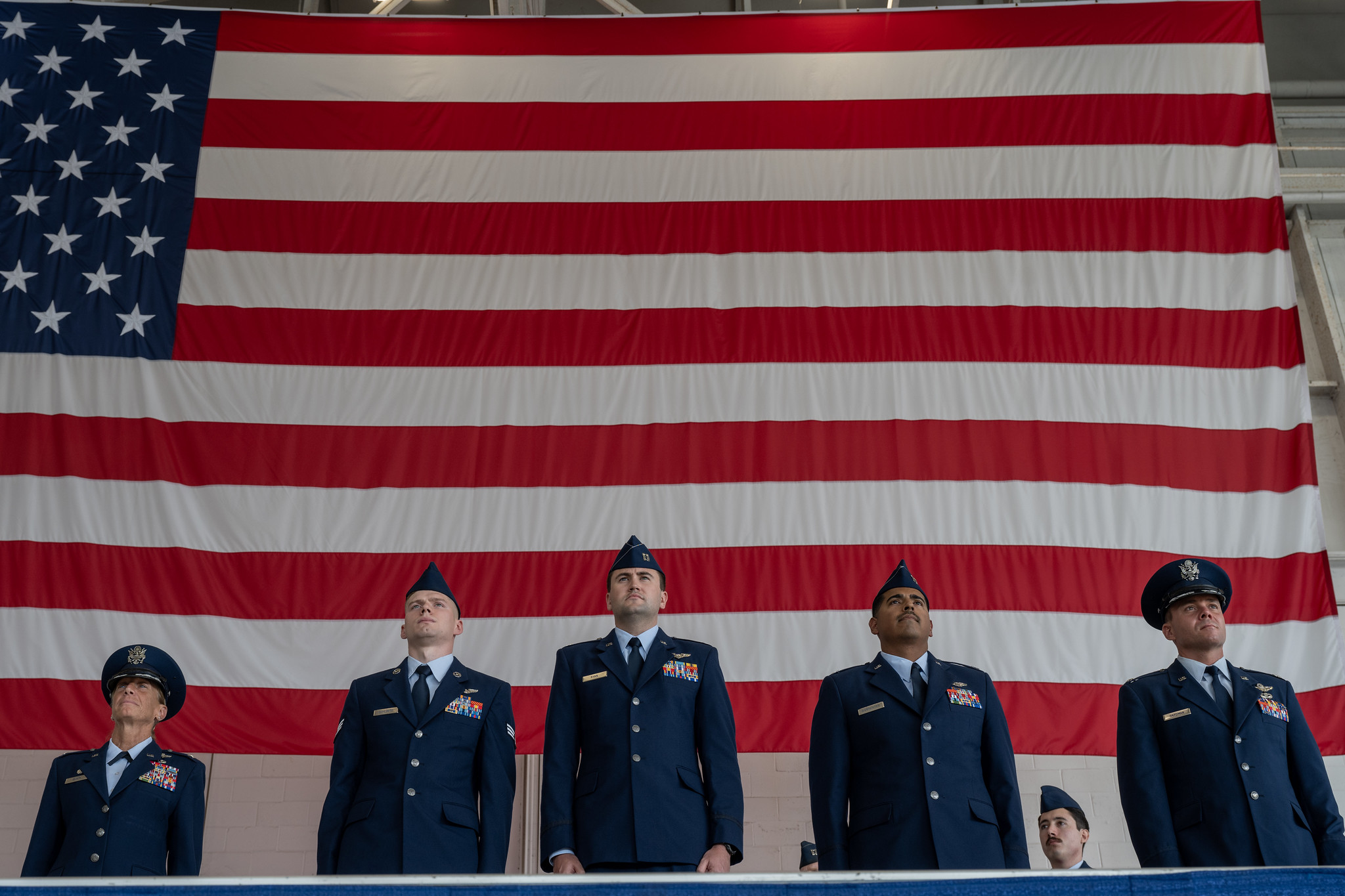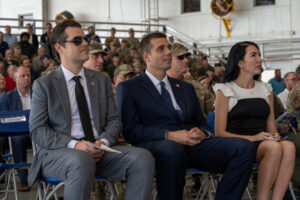
U.S. Congressman Matt Gaetz and Santa Rosa County Commission Vice Chairman James Calkins and his wife, Mariya, attended the presentation. Hurlburt AF photo.
The sounds of gunfire woke U.S. Air Force Captain James Ryan on an early August morning in 2021.
“There’s a problem, we have to go now,” his aircraft commander, U.S. Air Force Lt. Col. Scott Hardman, told Ryan from their deployed location in Afghanistan.
The city of Kabul, Afghanistan would soon fall to Taliban Forces and a group of U-28A Draco units from Hurlburt Field, Florida, had been tasked with supporting the ongoing evacuation of roughly 2,000 Americans.
Two years later, on Friday, Nov. 17, 2023, those members received the nation’s highest honor for aerial achievement – the Distinguished Flying Cross. U.S. Congressman Matt Gaetz and Santa Rosa County Commission Vice Chairman James Calkins were in attendance.
The presentation of the Distinguished Flying Cross represented a milestone for the U-28A community as it was the first-ever awarded to a Draco aircrew.
“They were ready to execute, they were ready to save lives and they were ready to answer the nation’s call,” Black said. “For its entire existence, the U-28 community has lived in the shadows of recognition, but today there are no shadows.”
Team No. 1: Draco 42 Dayline
The three teams began their two-day mission on the morning of August 15, 2021. As one crew would land, another would take off to provide constant intelligence, reconnaissance and surveillance support over the next 24 hours.
While the Draco 42 dayline crew prepared to depart for a sortie supporting the evacuation of the U.S. Embassy in Kabul, a firefight involving Afghan security forces broke out roughly 100 yards from their aircraft.
Knowing the urgency of their mission, U.S. Air Force Capt. Max Arnold said their team decided to proceed, taking off from their deployed location toward the U.S. Embassy.
“The sounds of the gunfire and the situation at the embassy only made us more eager to get after it and make sure we did our jobs,” explained Arnold, a 319th Special Operations Squadron U-28A Draco pilot. “All of our training and instinct kicked in and we almost did our jobs subconsciously at that point.”
Moments into their flight, opposing forces fired a rocket toward the U-28A. Realizing they had no time to spare, the pilots performed a quick descent as the rocket passed just above the aircraft.
“That encounter only bolstered the tenacity that we had to try and get after the mission and counter these threats that we faced and we knew our partner forces were facing,” Arnold added. “It really set the tone for the rest of the flight.”
The Draco 42 team continued its mission, providing overhead support of the ongoing embassy evacuation. Their initial flight ended with the crew landing in a recovery airfield, swarmed by crowds of unidentified and armed personnel.
Later that night, Draco 42 would be tasked with an additional sortie, providing support for the ongoing evacuation efforts at Hamid Karzai International Airport.
Team No. 2: Draco 3 Nightline
Standing by to relieve their teammates, the Draco 43 nightline team took off into the night sky on Aug. 15, 2021.
Traveling toward the airport, enemy anti-aircraft artillery targeted their U-28A – forcing the pilots to perform low-level defensive maneuvers to evade the surrounding threats.
Flying above Hamid Karzai International Airport, Draco 43, served as an “eye in the sky,” searching the area below for potential security breaches.
As their mission progressed, they could see large numbers of Afghans surrounding the perimeter of the airfield. Eventually, the crowd went on to surge the perimeter.
“There were just packs of people pushing onto the airfield,” said U.S. Air Force Capt. Nicklaus Lutz, a 319th SOS combat systems officer. “There was a lot of movement and a lot of craziness going on.”
Lutz added that to make matters even worse, his crew realized that members inside the air traffic control tower below had fled.
“That’s not a conversation you expect to have after takeoff, especially after you’ve already been shot at,” he said. “One situation we thought about was that when we landed we were going to be on our own.”
Without a functional control tower on the ground, the crews also helped to de-conflict inbound air traffic, which consisted mostly of C-17 Globemaster III aircraft assisting with the evacuation efforts.
As chaos ensued, Lutz recalled one moment of hope for his team.
“A group of U.S. Marines walked out on the airfield with their arms spread out,” Lutz described. “They cleared the airfield and there was a moment where we realized that we should be able to land and that we would be fine.”
Roughly an hour later, the Draco 43 nightline landed.
Walking away from the aircraft that night, the reality of what occurred sank in with their team, Lutz said.
“It dawned on us that we almost died,” Lutz explained. “It was a dire situation. There were so many variables. Getting shot at on takeoff, losing your landing base, not knowing who is hostile or who is a refugee, and then the possibility of getting shot at again. I was lucky to be on the crew I was on.”
Team No. 3: Draco 43 Dayline
As the sun began to peak over the horizon, the Draco 43 dayline crew climbed to a cruising altitude, heading directly for Hamid Karzai International Airport on the morning of Aug. 16, 2021.
Ryan, a 319th SOS combat systems officer, scanned their surroundings through a window toward the back of the U-28A.
“I remember hearing both pilots talking about avoiding the threats around us,” Ryan described. “We didn’t have time to really think about the situation. We had a job to do and we knew we needed to be there to support the guys on the ground.”
Upon arrival, the team found the airfield below littered with abandoned burning vehicles, debris and other signs of the destruction that occurred in the hours prior.
Draco 43 worked to maintain oversight, providing security information for the ground forces below. By sunrise, more and more people began crowding the airfield’s perimeter once again.
“People were piling up around the airfield, trying to flee,” Ryan explained. “They eventually surged past the breaking point, and all of a sudden there were thousands of people rushing the airfield.”
In an effort to manage the crowds, Draco 43 assisted with de-escalation and deterrence efforts until they reached critically-low fuel levels. However, the crew noted that landing would be a challenge in and of itself.
“There were just too many people on the airfield,” Ryan said. “We were lining up on the taxiway, because there was just nowhere else to land.”
Just before touching down, a small opening on the runway widened and Draco 43 pivoted to avoid landing near the largest parts of the crowd. The crew then quickly powered down their aircraft and barricaded their doors.
Shortly after, ground forces arrived to escort the crew through the chaotic scene on the airfield.
After nearly 24 hours of continuous flying, the mission of Draco 42 and 43 was complete.
“Being a real teammate”
It wasn’t until after they returned home that Ryan said his unit completely reflected on the severity of the events.
“It was really when I got back and got to listen to our tapes from the flights that some of the more serious moments really resonated with me,” he said, adding that the crews sounded more calm than he would have expected.
“In those moments, you could tell that training kicked in,” Ryan added. “We were well prepared and we worked well together. Every part of the U-28A mission set is a crew effort, and I’m incredibly fortunate and proud to have been surrounded by such outstanding aviators.”
For Lutz, the award reflects the crew’s ability to be tested beyond their limits.
“It means being a real teammate,” Lutz explained. “We all understood that what we were doing was dangerous and we made the decision to stay. I’m proud that I have a tangible moment where I was tested and I was able to be a part of something where my teammates knew that they could rely on me and that I could rely on them.”






























